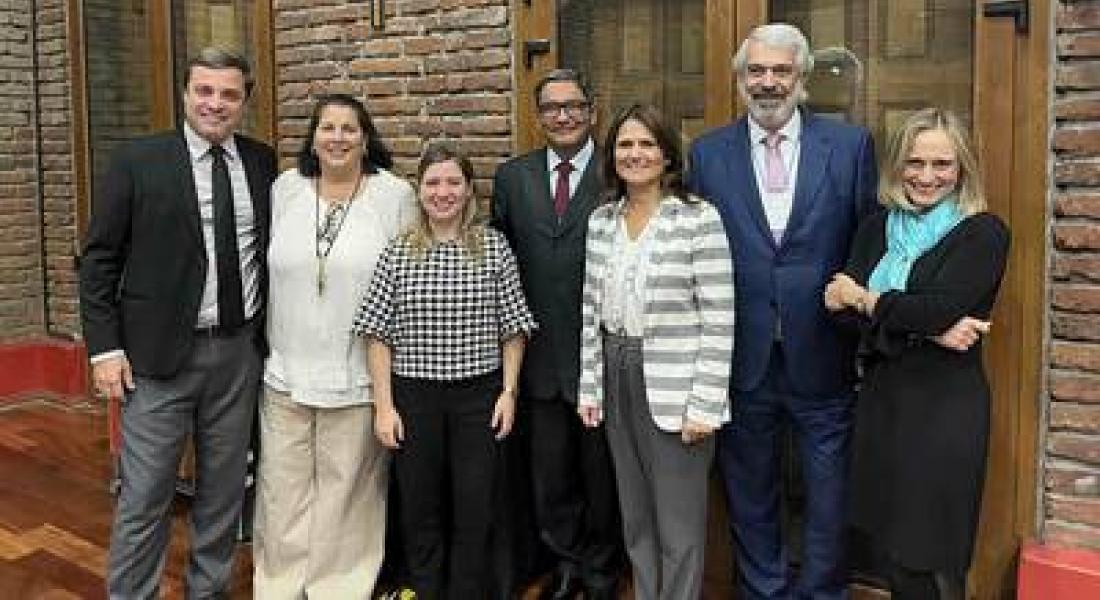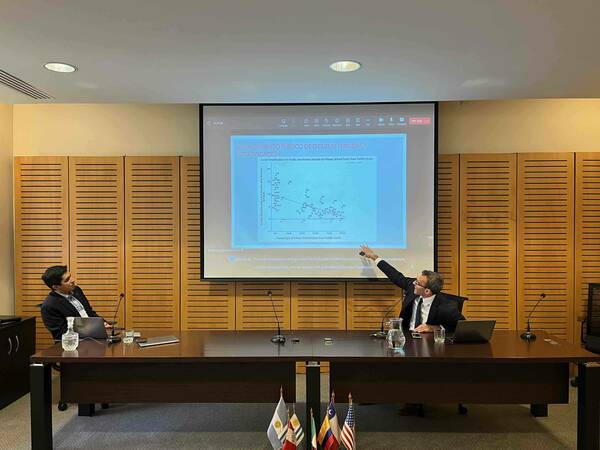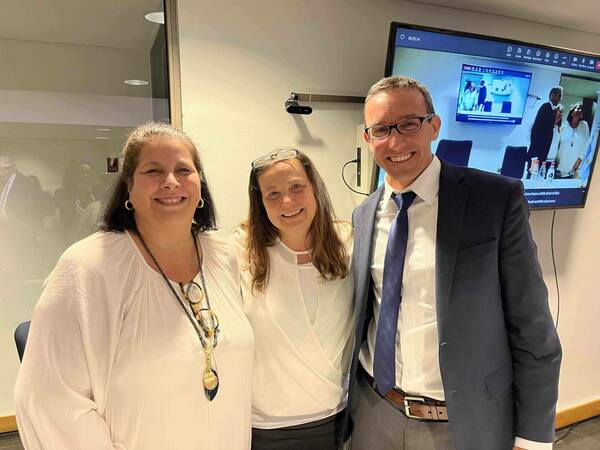
On May 9 and 10, the Faculty of Law of Pontificia Universidad Católica de Chile, Notre Dame Law School, and the Kellogg Institute for International Studies held a conference on religious liberty and education in Latin America. The event was co-hosted and led by Kellogg Faculty Fellow Nicole Stelle Garnett, the associate dean for external engagement and John P. Murphy Foundation Professor of Law at Notre Dame Law School; Kellogg Distinguished Research Affiliate Ana María Celis Brunet, a professor in the Faculty of Law and director of the UC Centre for Law and Religion at Pontificia Universidad Católica de Chile; and Kellogg Faculty Fellow TJ D’Agostino, the faculty program director of the International Education Research Initiative and assistant professor of the practice at the Institute for Educational Initiatives at the University of Notre Dame. The conference was funded in part by a grant from the Luksic Family Foundation.
The event, titled “Educational Pluralism in Latin America and the Caribbean: The Role of Faith-Based Actors and Comparative Legal Landscapes,” featured experts in the areas of law and education, including attorneys, senior NGO and higher education leaders, legal advisers, education researchers, and consultants from the United States and several Latin American countries. Representatives from Argentina, Brazil, Chile, Colombia, the Dominican Republic, El Salvador, Guatemala, Honduras, Mexico, and Peru attended and spoke at the conference. The event also included participants from different faith communities, such as the Adventist, Catholic, and evangelical churches.
The conference’s goal was to foster discussion and learn more about about the regulation and funding of faith-based schools in Latin America and about their contributions to civil society. The conference grew out of research supported by Notre Dame Law School and the Kellogg Institute, which is being conducted by scholars at Notre Dame and across Latin America. The first day of the conference centered on comparative legal landscapes, while the second day focused on the role and distinctive contributions of faith-based education.
 “It was both illuminating and a great privilege to interact with scholars and educators from so many different Latin American contexts. In Latin America, as in many other parts of the world, most countries provide at least limited support for faith-based schools, but also constrain their autonomy significantly,” said Garnett.
“It was both illuminating and a great privilege to interact with scholars and educators from so many different Latin American contexts. In Latin America, as in many other parts of the world, most countries provide at least limited support for faith-based schools, but also constrain their autonomy significantly,” said Garnett.
María Paz Madrid San Martín, a JSD candidate at Notre Dame Law School, said, “It was an honor to participate in this event because it was organized by the Pontifical Catholic University of Chile and by Notre Dame, my two alma maters. The conference, as Nicole said, was very successful because the organizers gathered law scholars that focus on constitutional law, religious freedom, or law of education. They also invited school leaders from different denominations.”
Madrid served as a panelist on the first day of the conference, where she spoke alongside university professors from Argentina and Brazil, and delved into case studies on autonomy and religious liberty. As a current J.S.D. student, she is working under Garnett’s supervision on two topics, one of which pertains to the study of education law and policy in Latin America.
“I think that this conference is very important because it is helping to form a network in Latin America that can better protect all those rights that are at the intersection of education and religious freedom, and it can also help to develop education law as a separate and substantive new field of study,” Madrid said.
The panelists addressed a wide range of topics that interweave law and education and are pertinent to education systems in Latin America and the Caribbean. Some topics covered during the conference include legal regulation regarding parental rights; constitutional and global perspectives on educational pluralism; religious freedom and non-discrimination; and the dynamic relationship between K–12 education, law, and religion.
 D’Agostino from the University of Notre Dame provided a regional overview of faith-based education in Latin America and the Caribbean during the second day of the conference and also gave the closing remarks along with Garnett and Celis Brunet.
D’Agostino from the University of Notre Dame provided a regional overview of faith-based education in Latin America and the Caribbean during the second day of the conference and also gave the closing remarks along with Garnett and Celis Brunet.
“This workshop convened faith-based educators and scholars from across the region and across faith traditions, sharing new research and building networks on an important and under-studied topic,” he said. “This is exactly the kind of critical contribution that makes Notre Dame unique, builds upon our Catholic character, and in the words of our founder, Father Sorin, helps us to serve as ‘a powerful force for good’ in the world.”
Despite its focus on religious liberty and education in Latin America and the Caribbean, the conference provided insights that are still valuable and relevant to understanding the education system in the United States. Following the conference, Garnett reflected on its importance: “As parental choice programs providing public support for children attending faith-based schools are expanding dramatically in the United States, the conference was particularly timely. We have much to learn from collaborations of this sort about our own education system."
Garnett hopes that this conference will spark more collaboration and continued conversation among legal and educational professionals who seek to advance and reshape the debate over the future of religious liberty and educational pluralism on a global scale.
This story originally appeared at law.nd.edu.
The Kellogg Institute for International Studies, part of the Keough School of Global Affairs at the University of Notre Dame, is an interdisciplinary community of scholars and students from across the University and around the globe that promotes research, provides educational opportunities, and builds partnerships throughout the world on the themes of global democracy and integral human development.





